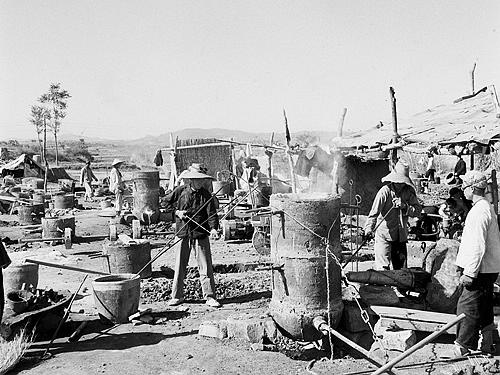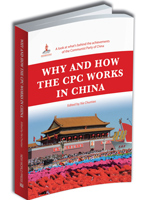|
 |
|
GREAT HURDLE: Workers producing steel in backyards using simple labor-intensive methods during a mass steel campaign in 1958, which caused a great waste of manpower and materials (XINHUA) |

Beijing Review continues to publish edited excerpts of Why and How the CPC Works in China. Edited chapter three—How Did the CPC Keep the People's Support Despite Its Mistakes—is as follows:
The CPC not only has experience in leading the Chinese revolution, construction and reform, but also has learned lessons from its past mistakes, which caused great losses to the party, state and nation. The serious mistakes mainly refer to those committed during the period from 1957 to 1976, when the "cultural revolution" ended. In Deng Xiaoping's words, the CPC had engaged in the "left" practice for 20 years. He said that for two decades the income of peasants and workers increased very little, and their living standards were very low. Productivity did not develop much. But the CPC did not lose the support of the people because of its mistakes.
The CPC's awareness and practice of responsibility, truly sharing weal and woe with the masses, and its responsible attitude, speech and action, showing that it has the courage to face and correct mistakes, won the understanding and support of the broad masses of the people.
From 1949-1956, it took New China only seven years to complete the socialist transformation of private ownership of the means of production and build a socialist society. At the end of 1957 most construction indicators of the first Five-Year Plan (1953-57) were over-fulfilled, due to the Chinese people's determination to change the impoverished and backward state of the country.
Under these circumstances, the "Great Leap Forward" movement (1958-60) was launched without serious investigation, research or even a pilot study by the CPC, which had no experience in socialist construction and an inadequate understanding of the laws of economic development and the basic situation of China's economy.
The "Great Leap Forward" disrupted the national economy, wasted a lot of manpower and resources, and caused a serious imbalance in the proportion of industry to agriculture. From 1957-1960, the average food consumption of urban and rural residents decreased by 19.4 percent, and per-capita consumption in rural areas shrank by 23.7 percent.
Losses caused by the "Great Leap Forward" amounted to an estimated 120 billion yuan ($18.9 billion, according to the latest exchange rate).
In the very difficult years from 1959-1961, people did not have enough to eat. In 1962, people's lives began to get better, and gradually reached their original level. But the "left" mentality persisted, and led to the disastrous "cultural revolution" (1966-76).
The "cultural revolution" was a catastrophe: Politically, it confused friend with foe, and people were unjustly, falsely, or wrongly charged or sentenced. Economically, it denounced the "doctrine of the unique importance of the productive forces," and "the national income lost 500 billion yuan ($78.8 billion, according to the latest exchange rate)." Culturally, it caused "a hundred flowers to wither" (only a limited number of operas and shows were produced and performed on stage), and education and science and technology suffered heavy losses. The 10-year calamity widened the economic, scientific, cultural and educational gap between China and the developed countries.
The "Great Leap Forward" and "cultural revolution" brought huge losses to the party, the state and the nation, and their lessons were profound. Through study of and reflection upon the "Great Leap Forward," the "cultural revolution" and other mistakes, people could come to different conclusions from different perspectives, but from the perspective of the CPC's independent exploration of its own path to socialist construction, the two movements had something in common, that is, they both reflected a serious departure of subjective knowledge from objective reality, and of effect from motive.
|
